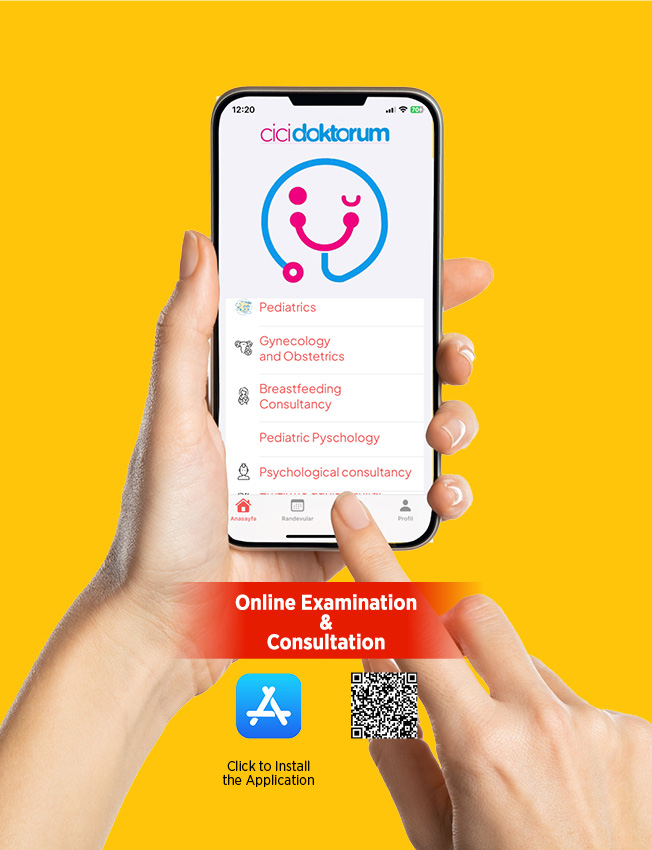Questions and Answers on Headaches During Pregnancy

Does headache frequency increase during pregnancy?
Headaches are one of the most common complaints among women, and they can be particularly frequent during the reproductive years. Women with a history of migraines or other types of headaches before pregnancy may experience more frequent headache attacks during pregnancy. For women who had no migraine attacks before pregnancy, headaches can be more common, especially during the first trimester.
Why do headaches increase during pregnancy?
The most common type of headache during pregnancy is tension-type headache. The increase in headaches during pregnancy can be attributed to heightened stress, anxiety, hormonal changes, and fatigue. For women who have a history of tension-type, migraine, or cluster headaches before pregnancy, if the symptoms align with their previous headache patterns, additional tests may not be necessary.
What are the characteristics of tension-type headaches during pregnancy?
– Affect the entire head,
– Have a pressing quality,
– Often appear towards the evening,
– Not very severe but still bothersome.
What are the characteristics of cluster headaches during pregnancy?
Cluster headaches, which may start before pregnancy and continue during it, have the following features:
– Always unilateral,
– Typically begin around the eye or temples,
– Pain starts quickly and intensifies within minutes,
– Continuous, excruciating pain,
– May include symptoms such as eye watering, redness, nasal congestion, nasal discharge, drooping eyelid, constricted pupil, fatigue, or agitation on the same side.
What are the characteristics of migraine headaches during pregnancy?
– Usually unilateral,
– Worsen with routine physical activity,
– Start with moderate intensity,
– Intensify over time,
– Pulsating in nature,
– Sensitivity to light and sound during the attack,
– Typically lasts between 4 to 72 hours,
– May be accompanied by nausea, vomiting, and sometimes visual or sensory aura.
Do migraine attacks have a negative effect on pregnancy?
Migraine attacks may become more frequent during pregnancy for women who had migraines before. However, these attacks do not adversely affect the pregnancy.
What precautions can migraine patients take before pregnancy?
For planned pregnancies, migraine sufferers might benefit from Botox treatments aimed at preventing pain, contributing to a more comfortable pregnancy. The doctor will plan the most suitable and necessary treatment considering both the mother and the baby.
What should be done if new headaches arise during pregnancy?
In one-third of pregnant women who visit the hospital with new headaches, the headache is found to be secondary to conditions like pregnancy-induced hypertension. Therefore, new headaches occurring during pregnancy or after delivery require detailed evaluation. Especially if headaches appear after the 20th week of pregnancy and are atypical or new, preeclampsia should be considered even if the blood pressure is normal.
What are the characteristics of headaches in preeclampsia?
– Usually widespread,
– Severe in intensity,
– Pulsating,
– Accompanied by blurred vision and light sensitivity,
– May also involve changes in consciousness.
Diagnosis is made based on a systemic examination, blood pressure measurements, eye examination findings, and neurological assessment.
What should be done in cases of sudden onset and unrelieved headaches during pregnancy?
Headaches that start suddenly, are extremely severe, are different in nature or intensity from previous headaches, awaken the patient from sleep, or do not improve with painkillers could indicate a serious underlying condition. Increased intracranial pressure related to pregnancy might trigger small vessel occlusions and increase the risk of blood clots. Therefore, headaches that do not match the typical characteristics of tension or migraine headaches should be evaluated by a neurologist. In cases of new and severe headaches without a previous history, cranial MRI might be necessary to clarify the diagnosis.
When should a pregnant woman see a doctor for headaches?
– If the headache starts suddenly and is severe,
– If the headache is accompanied by visual disturbances, abdominal pain, nausea, sudden weight gain, swelling in the hands and face,
– If the headache starts abruptly, is severe enough to wake the person from sleep, does not lessen, or is unlike any previously experienced headaches,
– If the headache is accompanied by fever and neck stiffness,
– If the headache worsens, accompanied by blurred vision, difficulty speaking, or numbness,
– If the headache starts after a head injury, even if mild.
Consultation with a neurologist is essential.
10 Tips to Prevent Headaches During Pregnancy:
1. Pay extra attention to sleep hygiene.
2. Follow healthy and balanced eating practices. Since blood sugar fluctuations can trigger headaches, regular snacks are important.
3. Identify and avoid headache triggers. Foods like chocolate, nuts, and those containing nitrites and sulfites, as well as factors like light, noise, extreme temperatures, and strong odors, can be triggers.
4. Avoid smoking. Smoking is a significant headache trigger and can also harm the baby.
5. Stay well-hydrated. Aim for at least 2-2.5 liters of water daily.
6. Exercise regularly. Many studies show that exercise can reduce headache attacks. Avoid inactivity and engage in daily walks and exercises.
7. Consider vitamin and mineral supplements. Magnesium tablets, in particular, may help alleviate headaches.
8. Take frequent showers. Warm showers may relieve tension-type headaches, while cold showers or applying cold to the face may help with migraines.
9. Do not use medications without consulting your doctor. Acetaminophen can be used for pain relief during pregnancy under medical supervision. Avoid other painkillers and migraine medications without consultation.
10. Try relaxation techniques. Yoga, meditation, and massage can be effective in relieving headaches.









